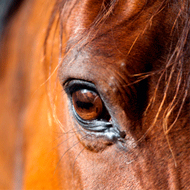
Imaging technique hailed as faster and safer for diagnosing eye infections
A pioneering clinical research programme has developed a new, faster and safer method for detecting and diagnosing equine eye infections.
Veterinary ophthalmologist Dr Eric Ledbetter at Cornell University Hospital for Animals has adapted in vivo corneal confocal microscopy, a human medicine technique that let doctors take pictures of living eyes in microscopic detail without a scratch.
He began using the technique in feline and canine patients and discovered two new infectious diseases of the eye that had never been described before.
Now he has become the first person to use the non-invasive technique in horses.
“Horses have very prominent eyes and live in environments that put their eyes at risk of trauma,” said Dr Ledbetter.
“They frequently have diseases of the ocular surface and other eye problems for which corneal confocal microscopy will be particularly useful.
"For example, horses frequently get fungal infections of the cornea. This has traditionally been a hard problem to diagnose— regular culturing methods of diagnosing fungal infections can take 10 to 14 days for results to come back, creating long treatment delays.”
By using an in vivo corneal confocal microscope with a focal depth of 1.5mm, Dr Ledbetter has been able to repeatedly examine and take images all the way through a horse’s 1mm-thick cornea— a frequent site of injury and infection as well as the eye’s first line of defence.
Confocal microscopy gets immediate results without needing a biopsy or any other kind of surgery.
Dr Ledbetter has used it to find and characterise tumours, scratches, foreign bodies, infections, immune-mediated ocular diseases, and other eye problems.
By collecting images of horses’ eyes with foreign bodies and comparing them to results from biopsy methods like cytology and histopathology, he has been able to validate confocal microscopy as a quicker non-invasive technique to image and accurately diagnose fungal infections of the cornea.
“By concurrently using both new and preexisting techniques, we compiled and published evidence that findings match," Dr Ledbetter said.
"This paves the way for veterinarians to definitively diagnose eye diseases in horses with only this new technology, minimising impact on the eye and saving time to get patients treatment faster.”



 The latest
The latest